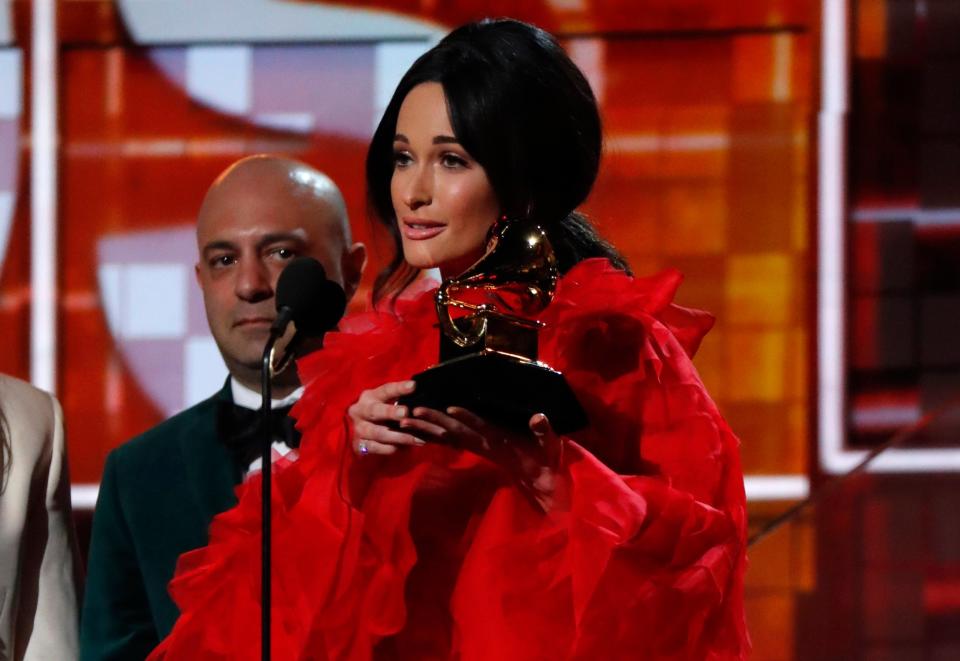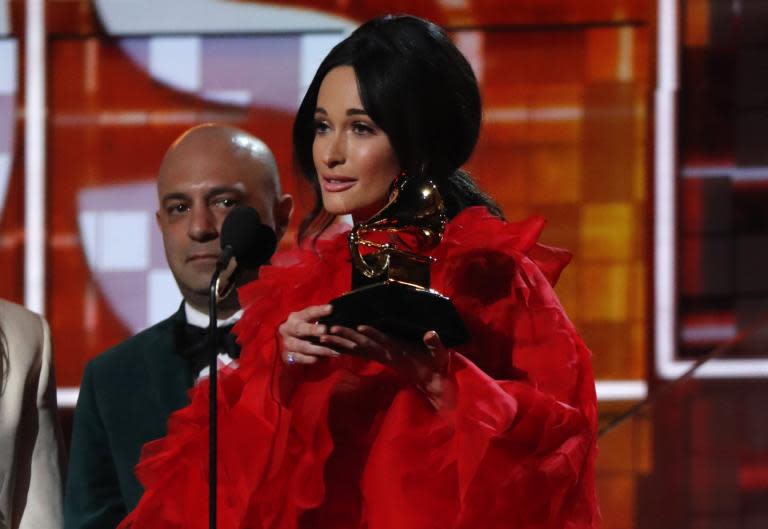What does the rise in 'woke' country music mean? The Republicans are losing hearts and minds among red-state Christian youth
This week, country singer Kacey Musgraves was given the meme treatment when a clip of her surprised reaction to winning a Grammy Award went viral. Of course there’s nothing particularly surprising about country singers winning awards. After all, despite changing demographics and the emergence of new genres, a 2018 CBS poll suggests that country is still America’s favourite music genre, easily surpassing rock, pop and hip hop. Yet the success of Musgraves, who walked away with four awards as the night’s big winner, represents a significant cultural shift.
In many ways, Musgraves – a 30-year-old Texas native signed to a Nashville record label – is the typical country star. But in others, she represents a growing number of musicians who are increasingly comfortable about breaking from country’s traditionally conservative mould. Notably, Musgraves is a vocal supporter of the LGBT+ community. She first made waves with the 2013 song "Follow Your Arrow", which tells listeners: “Kiss lots of boys / Or kiss lots of girls / If that’s something you’re into.” She even expressed regret that, as a child, she used to bully gay people and said she is “pissed” that her genre isn’t more LGBT-inclusive. In 2018 she wrote a “love letter” to the LGBT+ community during Pride month, saying their support “changed her as a human”.
These statements might not seem out of the ordinary in other genres, but a newly crowned gatekeeper of country music speaking this way is certainly unusual. Despite numerous country-to-pop crossovers, the cultures that surround country and its naughtier cousin are very different.
In pop, a reasonable amount of controversy is celebrated, but as the music of choice in America’s deep red, Republican-leaning states in the south and midwest, conservative Christian values have long been integral to country’s cultural identity. It is a genre where traditional values, horseback riding, beer swigging, Christianity and heterosexuality are celebrated.
In the past, musicians who deviate from this have been punished. Country music sensations the Dixie Chicks, who shared their opposition to the Iraq War while performing in London in 2003, are a particularly memorable example. Introducing "Travelin’ Soldier" – a song about a young soldier who died in Vietnam – the group said: “We do not want this war, this violence and we’re ashamed that the president of the United States is from Texas.”
These words caused outrage in the country community. Within days, the Dixie Chicks were blacklisted from radio stations across the southern states and fans boycotted their music. Despite being vindicated by changing public opinion in the years since, their careers were irreparably damaged, with a huge drop in support from their target demographic.
Musgraves is not alone in deviating from the conservative norm. Southern-born musicians such as Kesha and Miley Cyrus, whose new music often embraces their country roots through collaborations with country legends like Dolly Parton, are proud Democrats. Singer Kelly Clarkson, a Texas native and Tennessee resident, voted for Obama twice, saying that she couldn’t vote for Mitt Romney because of her belief in LGBT+ rights such as same-sex marriage. This might not seem controversial now, but in 2012 just 48 per cent of Americans believed gay marriage should be legal. In 2016, she voted for Hillary Clinton after tweeting that Donald Trump made her “genuinely frightened”. Despite this, Clarkson’s appeal remains broad – there’s even a meme which jokingly suggests that she is the only thing that evangelicals and gay men can agree on.
Carrie Underwood, who won American Idol three years after Clarkson, is the biggest US country star of the last two decades. Known for steering clear of politics, Underwood’s most recent album Cry Pretty features a song called "Love Wins", thought to be a nod to LGBT+ acceptance. She admits that another song, "The Bullet", was inspired by the gun massacre at a Las Vegas music festival in 2017.
Country megastar Taylor Swift, a fellow Tennessee resident with roots in Texas, famously broke her political silence last year by publicly endorsing Democratic candidates. After admitting she had been “reluctant” to air her political views, she wrote on Instagram that Republican senator Marsha Blackburn’s voting record “appals and terrifies” her. Swift's endorsement might not have swayed the senate race, but it caused a huge spike in voter registration in Tennessee, particularly among young people.
Even uber-liberal pop stars like Lady Gaga have embraced the traditionally conservative genre. Gaga released her country-inspired album, Joanne, in 2016 and performed its biggest hit, "Million Reasons", during her Super Bowl half-time show. Her current Grammy-winning anthem, "Shallow", is strongly influenced by country. Ally Maine – the musician she portrays in the Oscar-nominated film A Star Is Born – counted drag queens among her closest friends, but still belted out country ballads like "Always Remember Us This Way" to Arizona crowds.
Two decades ago, a country musician like Shania Twain voicing support for a Republican politician like Trump would have seemed unremarkable, as her support would likely have been presumed. Yet in 2018 her apparent endorsement of Trump in an interview caused global outrage, resulting in near-instant backtracking and an apology from the country star.
So what does the rise of “woke” or “politically correct” country music mean? This remarkable shift signals that, even in traditionally Republican-voting areas, the conservative Christian right is losing the battle over young minds.
Thanks to musicians like Musgraves, liberal country music stars no longer face career destruction for speaking out. Young country fans are singing from the lefty songbook and questioning the dominant ideas that, up until recently, have gone unchallenged in the genre's culture. Even in America’s reddest states, it is exclusionary evangelical conservatism, rather than left-wing politics, that is now becoming a toxic dealbreaker to an increasing number of young country fans. Republicans should be worried.

 Yahoo News
Yahoo News 

